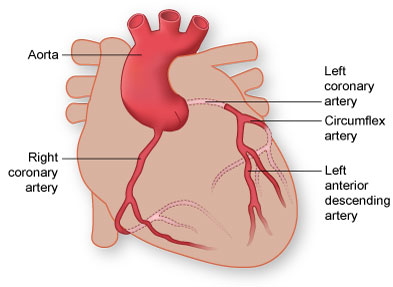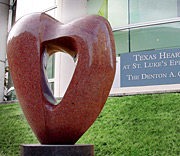Baylor St. Luke's Medical Center and Texas Heart Institute First in Texas
to Adopt Novel Non-Invasive Technology for Coronary Artery Disease
Houston, TX (October 21, 2015) – CHI St. Luke's Health–Baylor St. Luke's Medical Center (Baylor St. Luke's), home of the Texas Heart Institute (THI), announced today that it will be the first in Texas to adopt the only non-invasive technology when evaluating coronary artery disease.
This technology will allow Baylor St. Luke's and THI physicians to determine the extent of a patient's arterial blockage; the impact the blockage has on blood flow; and establish the right treatment plan opposed to traditional diagnostic procedures.

Coronary Arteries
New technology gives non-invasive diagnosis of CAD.
|
Research has shown the need to improve the accuracy of non-invasive tests to evaluate coronary artery disease. A recent study, which included data from more than 1,100 U.S. hospitals, found that 55 percent of the more than 385,000 patients with suspected coronary artery disease who underwent an invasive coronary angiography (ICA) had no obstructive coronary disease.1 Coronary artery disease, also known as coronary heart disease, is the leading cause of death for Americans and one of the most costly medical conditions to the United States healthcare system.
"Historically, we've been faced with either using tests we knew were not always accurate or putting a patient through an invasive procedure just to determine whether they would need another invasive procedure to restore blood flow," said Juan Carlos Plana, MD, FACC, FASE, Chief of Cardiology, THI. "This technology bridges the gap between the non-invasive and invasive tests within one platform. I believe it has the potential to completely change the way we manage coronary artery disease."
New data presented at the annual Transcatheter Cardiovascular Therapeutics (TCT) meeting and simultaneously published in the Journal of the American College of Cardiology, shows that this technology could lower the cost of evaluating patients with suspected coronary artery disease by as much as 32 percent and improve patient quality of life.
"This is an extremely high-tech approach in which we can visualize our patients' hearts," explained Emerson C. Perin, MD, PhD, Director, Research in CV Medicine, Medical Director, Stem Cell Center, THI; Medical Director, Catheterization Lab, Baylor St. Luke's Medical Center. "We can now focus on offering our patients the best and most advanced treatments available without first performing invasive diagnostic procedures."
By using this non-invasive method, the use of invasive coronary angiography is reduced, thereby driving down costs and improving overall healthcare economics and the overall patient experience in cases that would have otherwise been scheduled for invasive procedures.
"Fractional flow reserve CT (FFRCT) technology is an exciting addition to cardiovascular diagnostic "tool kit." Because patients vary tremendously with regards to risk, symptoms, activity level and imaging characteristics, there's still the need for the current variety of cardiac diagnostic testing strategies," said Raymond F. Stainback, MD, FACC, FASE, Medical Director, Noninvasive Cardiac Imaging, THI at Baylor St. Luke's; and Clinical Associate Professor of Medicine, Baylor College of Medicine. "The addition of FFRCT may improve accuracy, safety and efficiency when it comes to managing symptomatic patients who are at risk."
1 Patel, et al., Am Heart J 2014;167:846-852.e2.
About the Texas Heart® Institute
The Texas Heart Institute (www.texasheart.org), founded by world-renowned cardiovascular surgeon Dr. Denton A. Cooley in 1962, is a nonprofit organization dedicated to reducing the devastating toll of cardiovascular disease through innovative and progressive programs in research, education and improved patient care. Together with its clinical partner, CHI St. Luke’s Health-Baylor St. Luke’s Medical Center, it has been ranked among the top cardiovascular centers in the United States by U.S. News & World Report’s annual guide to “America’s Best Hospitals” for the past 24 years. The Texas Heart Institute is also affiliated with the University of Texas (UT) System, which promotes collaboration in cardiovascular research and education among UT and THI faculty at the Texas Heart Institute and other UT components.
For more information contact:
Brad Deutser
713-850-2105



